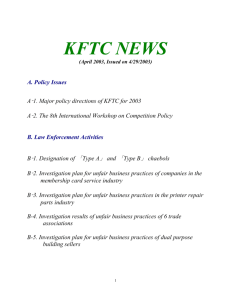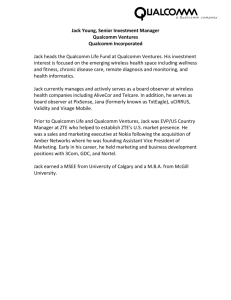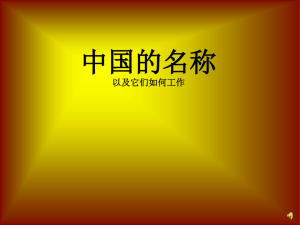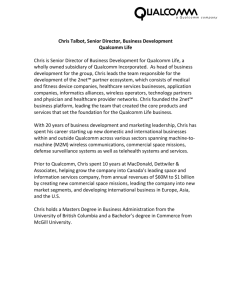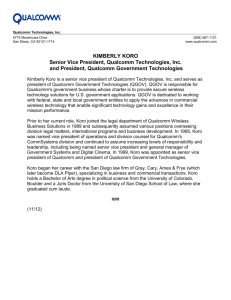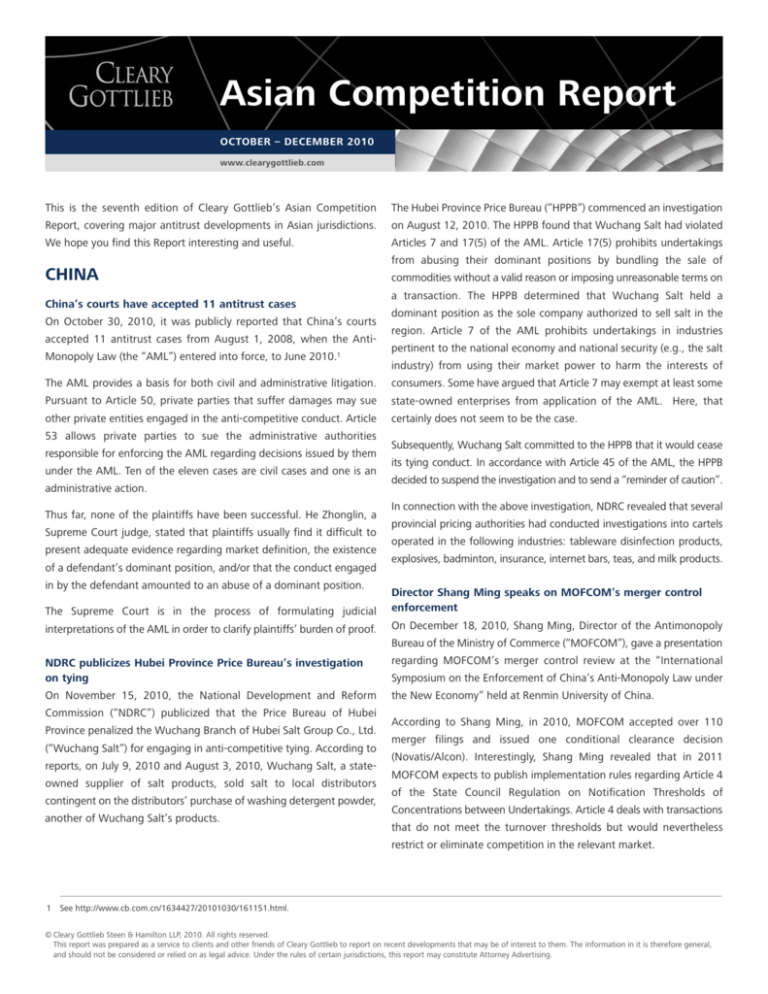
Asian Competition Report
OCTOBER – DECEMBER 2010
www.clearygottlieb.com
This is the seventh edition of Cleary Gottlieb’s Asian Competition
The Hubei Province Price Bureau (“HPPB”) commenced an investigation
Report, covering major antitrust developments in Asian jurisdictions.
on August 12, 2010. The HPPB found that Wuchang Salt had violated
We hope you find this Report interesting and useful.
Articles 7 and 17(5) of the AML. Article 17(5) prohibits undertakings
from abusing their dominant positions by bundling the sale of
CHINA
China’s courts have accepted 11 antitrust cases
On October 30, 2010, it was publicly reported that China’s courts
accepted 11 antitrust cases from August 1, 2008, when the AntiMonopoly Law (the “AML”) entered into force, to June 2010.1
commodities without a valid reason or imposing unreasonable terms on
a transaction. The HPPB determined that Wuchang Salt held a
dominant position as the sole company authorized to sell salt in the
region. Article 7 of the AML prohibits undertakings in industries
pertinent to the national economy and national security (e.g., the salt
industry) from using their market power to harm the interests of
The AML provides a basis for both civil and administrative litigation.
consumers. Some have argued that Article 7 may exempt at least some
Pursuant to Article 50, private parties that suffer damages may sue
state-owned enterprises from application of the AML. Here, that
other private entities engaged in the anti-competitive conduct. Article
certainly does not seem to be the case.
53 allows private parties to sue the administrative authorities
responsible for enforcing the AML regarding decisions issued by them
under the AML. Ten of the eleven cases are civil cases and one is an
administrative action.
Thus far, none of the plaintiffs have been successful. He Zhonglin, a
Supreme Court judge, stated that plaintiffs usually find it difficult to
present adequate evidence regarding market definition, the existence
of a defendant’s dominant position, and/or that the conduct engaged
in by the defendant amounted to an abuse of a dominant position.
Subsequently, Wuchang Salt committed to the HPPB that it would cease
its tying conduct. In accordance with Article 45 of the AML, the HPPB
decided to suspend the investigation and to send a “reminder of caution”.
In connection with the above investigation, NDRC revealed that several
provincial pricing authorities had conducted investigations into cartels
operated in the following industries: tableware disinfection products,
explosives, badminton, insurance, internet bars, teas, and milk products.
The Supreme Court is in the process of formulating judicial
Director Shang Ming speaks on MOFCOM’s merger control
enforcement
interpretations of the AML in order to clarify plaintiffs’ burden of proof.
On December 18, 2010, Shang Ming, Director of the Antimonopoly
Bureau of the Ministry of Commerce (“MOFCOM”), gave a presentation
NDRC publicizes Hubei Province Price Bureau’s investigation
on tying
regarding MOFCOM’s merger control review at the “International
On November 15, 2010, the National Development and Reform
the New Economy” held at Renmin University of China.
Commission (“NDRC”) publicized that the Price Bureau of Hubei
Province penalized the Wuchang Branch of Hubei Salt Group Co., Ltd.
(“Wuchang Salt”) for engaging in anti-competitive tying. According to
reports, on July 9, 2010 and August 3, 2010, Wuchang Salt, a stateowned supplier of salt products, sold salt to local distributors
contingent on the distributors’ purchase of washing detergent powder,
another of Wuchang Salt’s products.
Symposium on the Enforcement of China’s Anti-Monopoly Law under
According to Shang Ming, in 2010, MOFCOM accepted over 110
merger filings and issued one conditional clearance decision
(Novatis/Alcon). Interestingly, Shang Ming revealed that in 2011
MOFCOM expects to publish implementation rules regarding Article 4
of the State Council Regulation on Notification Thresholds of
Concentrations between Undertakings. Article 4 deals with transactions
that do not meet the turnover thresholds but would nevertheless
restrict or eliminate competition in the relevant market.
1
See http://www.cb.com.cn/1634427/20101030/161151.html.
© Cleary Gottlieb Steen & Hamilton LLP, 2010. All rights reserved.
This report was prepared as a service to clients and other friends of Cleary Gottlieb to report on recent developments that may be of interest to them. The information in it is therefore general,
and should not be considered or relied on as legal advice. Under the rules of certain jurisdictions, this report may constitute Attorney Advertising.
ASIAN COMPETITION REPORT OCTOBER – DECEMBER 2010
2
Beijing court issued a ruling on Baidu’s “anti-unfair
competition” suit
HONG KONG
Plaintiffs, Baidu Netcom Science Technology Co., Ltd. and Baidu.com
Update on Hong Kong’s Competition Bill
Times Network Technology (Beijing) Co., Ltd. (jointly, “Baidu”),
As we noted in the Asian Competition Report for the second quarter
alleged that defendants, Qizhi Software (Beijing) Ltd. (owner of the
of 2010, on July 2, Hong Kong’s Legislative Council published the
360 security software line) and Beijing San Ji Wu Xian Internet
Competition Bill. Since October 8, the bill has been under review by
Technology Ltd. (operator of www.360.cn) (jointly, “360”), engaged
a Bills Committee, which is accepting comments and questions
in unfair competitive behavior. According to news reports, on
regarding the bill. The committee may propose amendments as it
December 20, 2010, the Beijing Second Intermediary People’s Court
sees fit. After this step, further debate will follow in the Legislative
ordered 360 to pay Baidu RMB 385,000 (~$58,000; €44,000).
Council. Public reports indicate that passage is expected in 2012.
Baidu alleged that in March 2010, 360 claimed that two types of
INDIA
Baidu software were “malicious plug-ins” that might cause harm to
Baidu further learned that 360 added an anti-virus program designed
Competition Commission of India (“CCI”) rules in several
important cases brought by private parties
to remove the Baidu software. Users may uninstall the Baidu
The CCI issued decisions in several cases this quarter. These decisions
software simply by using 360’s default anti-virus settings.
give some indication of the CCI’s approach to the following issues:
It was reported that the court found that 360’s conduct constituted
n
computers and that users should delete the software. In July 2010,
Definition of a horizontal agreement. In Neeraj Malhotra v.
“unfair competition.” The news articles do not disclose which laws
Deustche Post Bank Home Finance, the complainant alleged that
were invoked.
Deutsche Post Bank had abused its dominant position (through
the implementation of unfair pre-payment policies) and engaged
From the frequent use of the language “unfair competition” in the
in price fixing through collusion with fifteen other banks. The
news articles, it is likely that the court relied on the Anti-Unfair
Director General for Banking held in 2009 that there had been no
Competition Law. Indeed Article 14 of the Anti-Unfair Competition
abuse of dominance, but that anti-competitive agreements had
Law prohibits entities from fabricating or spreading false information
been entered into by the banks, which were in contravention of
to harm a competitors’ business reputation. It was reported that 360
the Competition Act 2002. The CCI overturned this decision. The
claimed that it should not be considered a competitor to Baidu.
case largely hinged on whether the word “agreement,” as
However, in a 2007 ruling, a court decided that Baidu and 360 were
stipulated in Section 3 of the Competition Act, implied a formal
both network service providers and thus competitors.
“meeting of minds” or merely an informal verbal contract. The
majority view held that there had to be sufficient evidence to
MOFCOM to combine three tasks to “ensure the security of
domestic industries”
suggest that a formalized price-fixing arrangement had been
entered into by the parties.
On December 22, 2010, the Minister of Commerce, Chen Deming,
stated in his annual working report that MOFCOM intends to
n
To prove abuse of a dominant position, complainant must
combine (i) the foreign investment administration (approval for
establish that appointment of exclusive distributor will have an
foreign investments in China); (ii) merger control review; and (iii)
appreciable adverse effect on competition. In Manish Singh v.
national security review to “ensure the security of domestic
Roger Williams & Ors, the complainant had previously been one of
industries” in accordance with the laws. It is unclear how MOFCOM
the main distributors for Pharmacopecia (a “not for profit”
will combine these three areas and to what extent the measure will
pharmaceutical standard setting organization) in India. In the
impact foreign companies. The stated objective – protecting
previous year, Pharmacopecia had terminated all distributorship
domestic industries – may give pause to foreign companies
contracts in India and appointed a single company, LGC
considering acquisitions of high-profile Chinese companies,
Promochem, as its exclusive authorized distributor. The
particularly companies in key industries (defense, oil and gas,
complainant alleged that the exclusivity agreement between
telecoms, coal, aviation, steel and iron ore, information technology,
Pharmacopecia and LGC Promochem gave rise to an abuse of
etc.) or with prominent local brands.
dominance. The CCI ruled that such a claim could not be
substantiated, as the fact that Pharmacopecia has appointed LGC
www.clearygottlieb.com
ASIAN COMPETITION REPORT OCTOBER – DECEMBER 2010
n
3
Promochem as its exclusive distributor does not necessarily
organized by the Kagoshima Prefecture. According to the JFTC, in
indicate that the organization is abusing its position, nor can it be
order to prevent price competition, the implicated companies
concluded that the appointment of the distributor will have an
collectively decided the winner of certain bids and ensured that the
appreciable adverse effect on competition in the market.
designated winner would be awarded the tender. The total amount
Complainant’s burden of proof. In Travel Agents Association of
India v. British Airways, the complainant, a trade association of
of fines issued by the JFTC was over ¥1.4 billion (~$17.5 million;
€13 million).
travel agents in India, alleged that British Airways’ refusal of
On November 18, 2010, the JFTC announced that it had fined
ticketing authority to the association’s members had the effect of
manufacturers and distributors of electric wires a total of
diluting market competition. British Airways’ refusal to deal with
approximately ¥10.8 million (~$130,000; €97,000) for using
accredited agents and its exclusive agreements with larger travel
common price lists, copper price fluctuation indexes, and discounts.
agents was, according to the complainant, an anti-competitive
agreement. The allegations were rejected by the CCI because the
complainant provided nether details of exclusionary agreements
entered into by British Airways nor any data or particulars that
might reflect the adverse impact on competition in India.
CCI fine for failure to cooperate with an investigation
upheld by Competition Appellate Tribunal
CCI issued a fine of INR 10 million (~$221,000; €167,000) to
Kingfisher Airlines for failing to supply information in connection
Finally, on December 20, 2010, the JFTC fined 30 companies for bidrigging contrary to Article 3 of the AMA. The JFTC found that these
companies had colluded to designate successful bidders for certain
construction works organized by the Iwate Prefecture. The JFTC
imposed a total fine of over ¥362.5 million (~$4.4 million;
€3.3 million) for this violation of the AMA.
SOUTH KOREA
with CCI’s ongoing investigation into the company’s alliance with
Korea Fair Trade Commission (“KFTC”) appoints new
chairman and vice-chairman
Jet Airways. The strategic alliance between Jet and Kingfisher
Dong-Su Kim, the Chairman of the Export-Import Bank of Korea, has
includes code-sharing on domestic and international flights as well
been appointed the new Chairman of the KFTC. He succeeds Ho-Yul
as a joint fuel management agreement. Section 44(b) of the
Chung. Dong-Su Kim spent most of his professional career at the
Competition Act 2002 stipulates that if any party to a combination
Ministry of Strategy and Finance, where he held a Vice-Minister
“omits to state any material particular knowing it to be material, such
position before moving to the Korea Exim Bank. The KFTC also
person shall be liable to a penalty which shall not be less than rupees
appointed current standing Commissioner Jae-Chan Jung as the new
fifty lakhs (~$110,000; €83,000) but which may extend to rupees
Vice-Chairman of the KFTC. Jae-Chan Jung has spent much of his
one crore (~$221,000; €167,000), as may be determined by the
career with the KFTC.
Commission.” Following an appeal by Kingfisher airlines, on
December 13, this decision was upheld by the Competition Appellate
Tribunal.
Supreme Court holds that minimum resale price
maintenance (“RPM”) may be justified in some cases
On November 25, 2010, the Korean Supreme Court issued an
JAPAN
interesting judgment allowing a party accused of minimum RPM to
present arguments justifying its conduct. This seemingly conflicts
Japan Fair Trade Commission (“JFTC”) continues strict
enforcement against unreasonable restraints of trade
In three cases decided during the final quarter of 2010, the JFTC
continued its strict enforcement of Article 3 of the Antimonopoly Act
with the language of the relevant statute, the Monopoly Regulation
and Fair Trade Act (“MRFTA”), which, in Article 29, paragraph 1,
provides that minimum RPM is prohibited per se.
(“AMA”), which prohibits unreasonable restraints of trade. Of note is
In the case at issue, a pharmaceutical company entered into an
the JFTC’s focus on illegal bid-rigging of tenders organized by public
agreement with distributors that set the price paid by insurance
bodies.
companies as the minimum resale price. If a distributor charged less
In a case decided on November 9, 2010, the JFTC issued cease and
desist orders against 31 companies, and fines for 27 of those 31
companies, for violating Article 3 of the AMA. The JFTC found that
the 31 companies had agreed to rig bids for offshore works
www.clearygottlieb.com
than the minimum, the manufacturer reserved the right to stop
selling to them and to seek damages. The manufacturer in fact
imposed sanctions against distributors that did not abide by the
agreement. The KFTC investigated and imposed a fine for violation
of the MRFTA. The company appealed.
ASIAN COMPETITION REPORT OCTOBER – DECEMBER 2010
4
The Korean Supreme Court held that minimum RPM, even if it
its FLO TV offering. Qualcomm has announced that it intends to
restricts intra-brand competition, may be justified in exceptional
cease offering FLO TV in March 2011, and in December 2010 it sold
circumstances. Valid justifications may include promotion of inter-
the spectrum over which it broadcast FLO TV in the United States to
brand competition, which in turn promotes consumer welfare. The
AT&T for $1.9 billion. In essence, Qualcomm has decided to exit the
Court further explained that it would consider all of the relevant
market. It is therefore not clear what role the KFTC’s investigation
factors, which may include: (1) the degree of inter-brand
had, if any, in discouraging Qualcomm’s allegedly abusive conduct.
competition; (2) whether the RPM promotes non-price competition
among distributors; (3) whether the RPM diversifies consumer choice;
KFTC releases 2011 business plan
(4) whether new entry is encouraged. The Court held that the
On December 15, the KFTC announced its business plan for 2011,
defendant has the burden of proof. In this particular case, the Court
which focuses on four policy objectives: (1) improving business
found that the company could not justify its minimum RPM.
relationships between large companies and small to medium sized
At this point it is unclear how, if at all, the KFTC will change its
approach to minimum RPM. Moreover, the Court’s ruling seems to
require an amendment to the MRFTA.
KFTC’s abuse of dominance investigation ends as it accepts
Qualcomm remedies
enterprises (“SMEs”) to promote mutual growth; (2) stimulating
competition in an effort to stabilize the livelihood of ordinary people;
(3) Enhancing fair trade by empowering consumers; and (4)
spreading a business culture of voluntary compliance with
competition law.
In connection with the first policy, the KFTC explained that it will
In 2009, the KFTC fined Qualcomm Inc. KRW 260 billion (~$231
increase efforts to correct abuses of intellectual property rights
million; €176 million) for its abusive licensing practices and its abuse
(“IPRs”), such as exclusionary cross-licensing or the imposition of
of its dominance in the cell phone chipset market. At the time, the
unfair conditions for licensing IPR, which were identified as issues in
KFTC noted that it would continue a separate investigation of
an investigation of the IT and pharmaceutical industries. The
Qualcomm’s potentially exclusionary conduct in the market for
investigation of the IT and pharmaceutical industries will be
certain multimedia functionality (and in particular, video software)
expanded to target the machinery, chemical, and other industries
on its chipsets. The KFTC’s review was launched following complaints
prone to IPR abuse. The KFTC will also monitor practices related to
from two Korean software companies.
SMEs’ ability to fairly compete online.
On December 13, 2010, KFTC concluded its investigation and
In support of the second policy, the KFTC plans to expand
accepted voluntary commitments from Qualcomm. In a press release
enforcement against cartels in consumer goods markets and to
last October, Qualcomm committed to licensing parts of its
actively pursue prosecution of bid-rigging. The KFTC will also
proprietary code to permit third parties, including software
investigate
developers in Korea and worldwide, to in essence develop video
monopolistic/oligopolistic markets and to lower entry barriers in the
software programs that would be competitive with some of the core
healthcare, broadcasting, communications, education, and energy
Qualcomm video software programs that operate on its applications
industries. Finally, the KFTC will carefully review transactions between
processors chipsets. The KFTC’s press release indicated that the
large distribution companies as well as cross-border deals.
and
introduce
programs
designed
to
open
licenses would be issued (and the source code disclosed) within 2 to
10 months, depending upon the nature of the information and
Qualcomm’s preparation. Qualcomm is subject to quarterly reporting
obligations. The KFTC says it expects the remedy would “encourage
entry of small start-up companies, which will lead to protection of
SMEs and encouragement of employment.”
There are clear questions about the promptness and effectiveness of
the KFTC’s investigation in the present case. Qualcomm’s dominant
video software that it protected from competition was used to power
www.clearygottlieb.com
The fourth policy will be supported by KFTC plans to encourage SMEs
to introduce antitrust compliance programs and continuation of the
KFTC’s efforts to educate Korean companies operating in domestic
and overseas markets about antitrust laws.
Contacts
OCTOBER – DECEMBER 2010
www.clearygottlieb.com
NEW YO RK
FRA NKFURT
One Liberty Plaza
New York, NY 10006-1470
T: 1 212 225 2000
F: 1 212 225 3999
Main Tower
Neue Mainzer Strasse 52
60311 Frankfurt am Main, Germany
T: 49 69 97103 0
F: 49 69 97103 199
WASHING TO N
2000 Pennsylvania Avenue, NW
Washington, DC 20006-1801
T: 1 202 974 1500
F: 1 202 974 1999
PA RIS
12, Rue de Tilsitt
75008 Paris, France
T: 33 1 40 74 68 00
F: 33 1 40 74 68 88
B RUSSEL S
Rue de la Loi 57
1040 Brussels, Belgium
T: 32 2 287 2000
F: 32 2 231 1661
LO NDO N
City Place House
55 Basinghall Street
London EC2V 5EH, England
T: 44 20 7614 2200
F: 44 20 7600 1698
MO SCOW
Cleary Gottlieb Steen & Hamilton LLP
CGS&H Limited Liability Company
Paveletskaya Square 2/3
Moscow 115054, Russia
T: 7 495 660 8500
F: 7 495 660 8505
CO LO G NE
Theodor-Heuss-Ring 9
50668 Cologne, Germany
T: 49 221 80040 0
F: 49 221 80040 199
RO ME
Piazza di Spagna 15
00187 Rome, Italy
T: 39 06 69 52 21
F: 39 06 69 20 06 65
MILA N
Via San Paolo 7
20121 Milan, Italy
T: 39 02 72 60 81
F: 39 02 86 98 44 40
HO NG KO NG
Bank of China Tower
One Garden Road
Hong Kong
T: 852 2521 4122
F: 852 2845 9026
B EIJ ING
Cleary Gottlieb Steen & Hamilton LLP
Twin Towers – West
12 B Jianguomen Wai Da Jie
Chaoyang District
Beijing 100022
T: 86 10 5920 1000
F: 86 10 5879 3902


